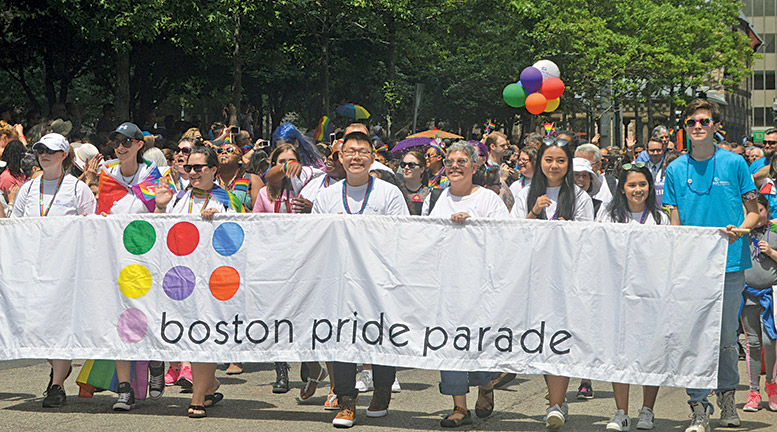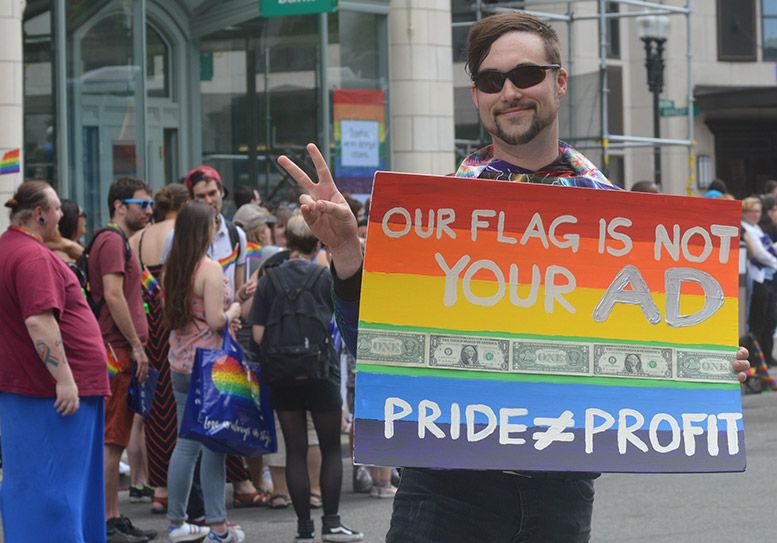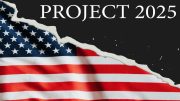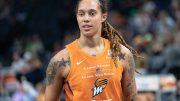Leaving out what many LGBTQ+ PoC community members see as an indication that Boston Pride isn’t as inclusive as it thinks itself to be; Reports surface from Boston Magazine that Boston Pride Didn’t consult their Boston Black and Latinx Pride Committee when composing the statement
By: Audrey Cole/TRT Reporter—
BOSTON, Mass.—Boston Pride recently came under fire after an initial official statement about Black Lives Matter’s protesters and police brutality backfired, according to local activists and members of the LGBTQ+ community.
“Boston Pride released a statement, which they later took down, that referenced their response to the murder of George Floyd and the current demonstrations against racial injustice,” according to Michael Histen aka Majenta, a philanthropic Boston Drag performer and winner of the first Boston Drag Gauntlet. “Many of us in the LGBTQ+ community felt it was tone-deaf, as it did not even include the phrase “Black Lives Matter…”
Exclusion of black, brown, and trans voices is an issue that continues to plague the organization over a number of years, which has prompted actions and demonstrations formerly, even causing the pride parade to a halt for 11 minutes in 2015. The release in question wasn’t received well.
“Boston Pride is a reactionary organization,” said JP Delgado Galdamez, Communications Associate at The Network/La Red. “Pride didn’t start showing they care about Black people and People of Color until members of these communities, often also people who are queer and transgender, started doing actions like blocking the parade route. Boston Pride did not read the room when they decided to post a statement that didn’t even meet the lowest bar of them all, saying #BlackLivesMatter.
According to Majenta, the most recent misstep is exasperating.
“Incredibly, the Boston Pride board statement called for individuals to take ‘concrete actions’ without actually listing any actions that Boston Pride itself would be taking to address systemic racism,” she said. “This remarkable lack of leadership—asking others to do the work without taking any action yourself—is truly galling.”
Delgado Galdamez said that Boston Pride’s initial release was not surprising.
“The community response was immediate and overwhelming,” they said. “Many of us know, from personal experiences, that Boston Pride wasn’t committed to supporting Black Lives Matter, and that was reinforced in the way the first statement was written. And I guess I was a little bit of a fool for believing that they would, by their own morals, support Black Lives Matter, as one of the members of their board is Deborah Drew, Secretary of the Massachusetts branch of the Log Cabin Republicans.”
Boston Pride penned yet another statement with the hashtag, #BlackLivesMatter, and vowed to do better.
“The Boston Pride Board has heard the voices of concern from members of the community regarding a previous statement posted on our website related to the recent atrocious events of the murders of Black and Brown people at the hands of police officers in so many places across this country,” the statement read. “We deeply apologize for the hurt and pain we caused by our shortcomings. We pledge to hold ourselves accountable now and in the future. We acknowledge that we need to do more as a social justice organization to not only communicate our outrage, horror, and intolerance of these acts of police violence but also to take substantive action to better address racism and white privilege within Boston Pride, the LGBTQ+ community and society at large.”
Black folks and people of color have made demands that the organization has failed to meet throughout the years and the initial release is a reflection of that dismissal, said Majenta.
“[It] did not address any of the issues that we have been calling for with Boston Pride, such as not allowing the police and corporations to participate in Pride events,” Majenta continued. “This stance, or lack thereof, shows that Boston Pride is not only unwilling to stand against systemic racism but is actively participating in its continuation.”
Eventually, the original release was replaced with an updated, more inclusive version on the Boston Pride’s website.
However, according to a story published by Boston Magazine, Boston Pride’s Black and Latinx Pride Committee, was not consulted regarding the board’s initial release.
Casey Dooley, the committee’s chair “is now beginning conversations with her committee about next steps, which she says will likely include a call for all Boston Pride board members to resign and make way for a more transparent and diverse leadership that she says feels long overdue,” the report read.
Boston Pride Responds
The revised release took a more direct approach in recognizing racism, police brutality, and its commitment to black and PoC communities. “Oppressions are interlocked, no one is free until we are all free. #BlackLivesMatter,”it concluded.
“We acknowledge that we need to do more as a social justice organization to not only communicate our outrage, horror, and intolerance of these acts of police violence against Black and Brown communities but also to take substantive action to better address racism and white privilege within Boston Pride, the LGBTQ+ community and society at large,” said Linda J. DeMarco, President of Boston Pride.
The organization will also be issuing short and long-term action plans to “better support LGBTQ+ communities of color.”
“We are inviting everyone to send suggestions to change@bostonpride.org so we can practice listening to our community,” DeMarco added.
According to DeMarco, she recognized the importance of working with local organizations in order for Boston Pride to be able to meet the needs of LGBTQ+ people of color.
“We are reaching out to Black Lives Matter, Black [and] Pink, MTPC, TransCend, and other Black and Brown community organizations to support them and have them work with us to make Boston Pride a better organization,” she said. “We need and want the input of Black and Brown communities. We are hopeful that working together we will create [a] better representation of the community and develop a community dialogue about the issues facing Black and Brown communities and the LGBTQ community. We are working on several initiatives that will be announced soon.”
DeMarco also agrees there is a lack of diverse representation on the board of directors and said the organization will change that.
“We are going to do a better job of adding board members who are people of color,” she said. “We had several members of our board who are persons of color, but we need more people from the Black and Brown community to join the board. We are seeking nominations from the community for new board positions.”
Police Involvement
One of the chief concerns of activists on behalf of people of color includes the involvement of police presence in pride celebrations.
According to a 2016 report published by The Rainbow Times, “Boston Pride [under for BP President Sylvain Bruni] had withdrawn the parade marshalship of Woburn Police Officer Anthony Imperioso after learning of several incendiary Facebook comments regarding Black Lives Matter demonstrators.
“When entire communities know the police primarily as a destabilizing and terrorizing force that incites violence and endangers Black and POC lives, it is unconscionable to invite the police to march alongside the very members of our community who they have brutalized,” Majenta said.
DeMarco acknowledged the birth of today’s LGBTQ rights movement and how police brutality was front and center then as well.
“In fact, the modern LGBTQ rights movement stemmed from Black and Brown trans individuals who stood up to persistent police harassment and violence at the Stonewall Inn Riots in 1969,” she said. “Boston Pride came out of that movement and held its first protest gathering in 1970. Fifty years later, the violence against Black and Brown people, especially Black trans women, undeniably demonstrates ongoing structural systems of oppression and racism, reminding us that our work is far from done.
To Majenta’s point, DeMarco said Boston Pride will make the organization’s concerns known to the Boston Police Department.
“For many years, [the] Boston Police Department has had an LGBTQ liaison that comes from the queer community so that they can ensure that our concerns are being communicated to police leadership,” DeMarco explained. “We have had a good relationship with [the] Boston Police and we would anticipate having community meetings with them to work out any issues and come to an agreement on police presence at our large-scale events, as their job is to protect all citizens in Boston.”
According to the City of Boston, the Pride parade is a permitted event that requires coordination with local law enforcement to ensure the safety of parade-goers.
“As a city that prides itself on our strong community policing model, it is imperative to strike the right balance between having a police presence for safety, and understanding the very heart of the issues that bring us together,” said Boston Mayor Marty Walsh on police presence at Pride. [NOTE: Mayor Walsh was sent several questions pertaining to Boston police officer’s current procedures and policies as outlined by the #8CantWait that many cities have pledged to uphold. Such questions pertained to the use of de-escalation techniques, a police warning before shooting anyone and requiring to report when a police officer points a weapon at a civilian. However, no specific answer was given to that series of questions.]
But, on June 11, as reported by the Boston Globe, “after weeks of protests around the country—and amid City Council scrutiny and calls to cut the departments funding—the Boston Police Department (BPD) recently announced changes to its use of force policy and pledged to bring and innovative policing initiative from New Orleans to the city.”
The BPD adopted 7 out of 8 recommendations of the #8CantWait Campaign, according to the story. The founder of the campaign, DeRay Mckesson, said to the Globe that the department “did not update the policies to require comprehensive reporting, notably when an officer points a gun at someone or threatens to point a gun at someone.”
Moving Ahead
Sharing in Dooley’s disbelief (from Boston Pride’s Black and Latinx Pride Committee), Delgado Galdamez said they expect more from BP.
“Boston Pride has been too long an organization led by people who do not represent those who experience the most violence in our communities,” they said. “As an LGBTQ community, we should be looking to organizations, like Pride, to lead the way in the fight for justice of all LGBTQ people, especially Black trans women. That’s why, right now, we as a community should follow the lead of Trans Resistance MA …”
Boston Pride isn’t the only LGBTQ+ Pride organization in the country that has been criticized for its lack of inclusion of LGBTQ+ people of color. Recently, LA Pride was also at the center of similar circumstances and through the years other Pride parades have also been halted by Trans PoC claiming lack of inclusion by said organizations, as reported by The Rainbow Times in the past 5 years.
Like many prides throughout New England, Boston Pride events were canceled this year due to underlying COVID-19 concerns and public safety. However, the organization plans to reboot its pride week events in 2021.
Boston Pride, with the support of Mayor Walsh, raised the Progress flag this year, which includes two additional black and brown stripes as well as the colors of the Trans flag at City Hall Plaza, as a symbol of solidarity with ‘black and brown brothers and sisters,’” DeMarco said. “Over the next year, Boston Pride, in partnership with the City of Boston and the LGBTQ+ community at large, will host listening sessions and will pursue creating a unique Pride Flag to be flown for Boston Pride 2021 and beyond. We invite everyone to participate in discussions surrounding the design for the new Boston Pride flag.”
According to Majenta, there is no pride until all are heard and treated with justice.
“Pride came from riots and fighting against oppression and working to dismantle unjust systems,” she said. “We can only have pride when we are amplifying the voices within our own community and fighting for their rights, not when we are providing corporations and the police with a platform that does not hold them responsible for their role in perpetuating an unjust system.”
The Human Rights Campaign recently released a letter, joined by prominent LGBTQ and civil rights organizations, condemning racism, racial violence, and police brutality while calling for action to combat these scourges. One hundred plus leaders of the nation’s most prominent LGBTQ and civil rights organizations, in and outside of Boston, signed the letter. Boston Pride does not appear to have signed the letter yet. Submissions appear to take time to show on the letter, according to other organizations, like Project Out and this newspaper, who’ve submitted their signatures but whose organizations/companies’ names aren’t visible yet.
EDITOR’S NOTE: BP could have signed the letter but their name may not have been yet added to the list, however, it was too late to ask them if they had by the time this story had gone to press.








